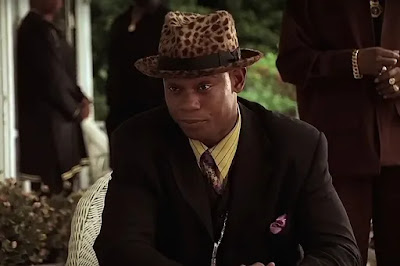Family Events: After gifting Dr. Cusamano a box of illegal Cuban cigars to thank him for his referral to Melfi, Tony attempts to branch out and socialize with some of the wealthy neighborhood families (who he coins, "the mayonnaises up the street"). Carmela worries about money. After Meadow eavesdrops on Carmela purchasing stocks, Carmela suggests that women should maintain individuality. After Tony realizes that Cusamano and his wealthy friends are using him as a token criminal association, Tony begins playing up fictional performances to mess with them.
Mafia Events: Pussy, Chris, and Paulie kill a young drug dealer in New York and bring home tons of his cash, which Tony wants to invest in stocks, legally. After Chris makes a racist scene in a restaurant, he and Adriana get invited to a party with rapper Massive Genius, where he explains he wants royalties from Hesh. Christopher arranges a meeting with Hesh; Adriana toys with the idea of becoming a music manager and introduces Massive to some musician friends. Hesh refuses to consider paying anything. After several struggles, Adriana's new band Visiting Day records a demo for Massive G, which he likes. Suspecting Massive has his eye on Adriana, Chris takes the demo to Hesh, who says the music is terrible.
Mental Health Events: Melfi has dinner with the Cusamanos and a few others and becomes uncomfortable when the group begins to discuss the Mafia, going as far as to defend Carmela's Murano glass after Jean dismisses it. Later in the bathroom, Melfi looks out the window toward the Soprano house and hears a loud groan. In therapy, Tony admits he's bored by his neighbors, but after golfing with them realizes they made him into a spectacle. Tony shares a story about Jimmy from the old neighborhood, a kid with a cleft palate who was bullied by. the crew, and admits to Melfi that Cusamano and his group made him feel like Jimmy.Significant Ideology: The importance of each group's cultural identity can be considered both superficially and in greater depth. On the surface, the episode deals with three cultures at odds with each other: Hesh, who is Jewish and is connected to both the early music industry and the Mafia, refuses to pay royalties he owes; Massive Genius, who is African American and a successful producer himself, is open to business with Adriana but seeks justice from Hesh over exploited music vocals; Christopher and Tony are proximally involved through their protection of Adriana and Hesh.
There are many cultural stereotypes tossed around by each group, Christopher and Hesh use racist language toward Massive Genius, Massive Genius suggests certain exploitative and legally related behaviors are common to Jewish people, and the upper class, professional Italians look down on the Sopranos and anyone in organized crime. But Cusamano's comment about the similarities between the mob and legitimate businessmen is important, not because they are the same in the way that he thinks, but because the white American businessman has largely been able to achieve without "whacking someone." Surely crimes are committed in business, but they're not judged in the way the Mafia's, gangster rap culture, or to lesser extent, Hesh's crimes are judged.
When Tony discusses his "Medigan" neighbors with Melfi, she tries to clarify, "you don't consider yourself white?" Tony says he does, but that he's not white the way Cusamano is white. It seems like this episode is about ethnicity, and it is, but it's about economic class even more. Hesh had to exploit someone else's talent passed off as his own in order to succeed in the music business; Tony, born into his father's Mafia wanted a good life which was only attainable through criminal means, and Massive Genius used his violent experiences to create art, which then became marketable. All three cultures were denied access to the legitimate American dream, because of their social and economic classes. Adriana is dangled before us as someone who has the potential to successfully cross cultures in a legitimate way, but in the end Christopher and Massive Genius reduce her to a sexual thing, ignoring her enthusiasm and ambition to succeed in the music business, which is easily and commonly done to women in lower economic classes.
Tony's financial worth and beautiful house may rival Cusamano's, but despite being literal next-door neighbors, he is still kept out of the upper class Italians' spaces (Ivy League, stock trading, the golf club). This is likely going to become an issue for the Soprano children, especially Meadow.
Italian Language:
Paisan = ("Talk about Paisan Pride, go Jovi! ") fellow Italian American
Medigan = American
Salcicc' = Italian sausage made of fresh pork and scraps of pancetta and pork neck
Que coso, ragazzo? = what's the thing, boy? (Adriana asks Chris when he's being distant).
Tony wraps a secret package for Cusamano with Carmela's help:























































